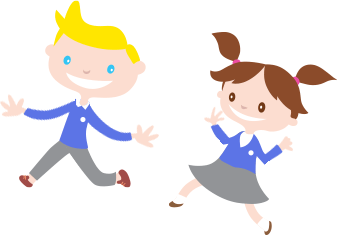Curriculum at St Wilfrid's
Our School Curriculum
To find out more about the curriculum offered at St Wilfrid’s Catholic Primary School, please explore the 'Our Classes' https://www.stwilfrd.bham.sch.uk/web/our_classes/155799
St Wilfrid’s caters for children from Nursery up to Year 6. The school also has the benefit of a dedicated group of support staff, working throughout the school, to help the children progress as much as possible throughout their time here.
The majority of the curriculum taught at St Wilfrid’s is laid down by the Government: in Nursery and Reception, the ‘Early Years Foundation Stage Statutory Framework’ is followed, while the curriculum taught in Years 1 to 6 is referred to as the ‘National Curriculum'.
The Early Years Foundation Stage Framework was updated in September 2021 and consists of seven Areas of Learning: Communication & Language; Physical Development; Personal, Social & Emotional Development; Literacy; Mathematics; Understanding the World; and Expressive Arts & Design.
The following subjects form the National Curriculum:
English; Mathematics; Science; Computing; History; Geography; Music; Art; Design & Technology; PE (Physical Education); Personal, Social & Health Education (PSHE); and Religious Education.
The National Curriculum was updated in September 2014, with schools given greater ownership of the ways in which they deliver the statutory content. At St Wilfrid’s, we are shaping the curriculum to meet the needs of our pupils and prepare them for life in modern Britain, driven by the following skills, traits and experiences:
Communication; Aspiration; Enjoyment; Emotional Awareness; Knowledge of the World; Awe & Wonder; Achievement; Possibilities; and Creativity.
Accessibility to the Curriculum
Accessibility to the curriculum for pupils who have Special Educational Needs and Disabilities, as well as attainment and progress of SEND pupils, is closely monitored by our SENCO. Lessons are adapted and differentiated for pupils, based on their needs and individualised targets. For more information on how the school meets the Equality Act 2010 and the Special Educational Needs and Disability Regulations 2014, please see the SEND section of the website.
English
Our English language can enrich all our lives and we aim to provide all our pupils with the skills and confidence to speak, read and write effectively in a variety of situations.
Much of the work for English is carried out during the morning and in Key Stage One, children are split into groups for RWI: a phonics scheme. Key Stage Two follow the National Curriculum for English and teachers plan carefully for the needs of their classes and to ensure skills are built upon previous learning. This session generally begins with a whole class teaching time. The children will then often work in small groups, either independently or with support from the teacher or support staff. This group work involves activities such as reading, writing, spelling and handwriting.
Mathematics
Our aim is that all our children, regardless of ability, should feel happy dealing with and using numbers in everyday situations.
Mathematics is taught mainly in the mornings. Depending on the age of the children, this can vary from 45 minutes to one hour.
The lesson has a similar format to English. It commences with the whole class engaged in a started activity for 5 to 10 minutes. This is then followed by the main focus of the lesson. The children will then work independently, in pairs, or in groups, on tasks associated with the main focus of the lesson. The last ten minutes is used to review, extend or evaluate the children’s progress.
RE (Religious Education)
As a Catholic School, Gospel values are intrinsic to everything that we do. Religious Education is taught in accordance with the Agreed Syllabus from the Archdiocese of Birmingham. Collective worship is daily - this is either as a class, key stage or whole school, and led by both staff and children; once a week we celebrate Mass together in church.
Parents may, if they wish, withdraw their children from the arrangements for collective worship and Religious Education - such requests need to be made, in writing, to the Headteacher.
Science
The science curriculum is taught through topics.
Emphasis is placed on first hand experiences, identifying, questioning and investigations, while children are encouraged to develop their thinking skills throughout this subject.
Computing
Computers are very much a part of the age in which we live and we feel that children must become familiar with their effective use.
Computing, therefore, forms a very important part of our School Development & Improvement Plan. In the 2014 National Curriculum, the emphasis has moved from being able to use computers effectively to pupils being taught programming skills, ranging from floor robots to writing their own computer games. We have computers in all classrooms, as well as an ICT suite of PCs, a bank of laptops and a bank of iPads for use by all classes.
History
The curriculum for the younger children aims to teach an awareness of the past, and ways in which it was different from the present. Children learn about everyday life in the past, the lives of some famous men and women, and major historical events, such as the Great Fire of London.
At Key Stage 2 children are taught about important episodes in Britain’s past, local history and about Ancient Civilisations.
Geography
Through the study of Geography we hope to develop within the children a sense of geographic identity. Studying real places and gaining an understanding of the interaction between people and the places where they live will achieve this.
Fieldwork, the use of information technology and a variety of resources such as maps and photographs are used to help gain this understanding.
Music
We aim to foster an enthusiasm for music. Through experimenting with sound, the children develop skills of listening, co-operation and communication.
During their time at St Wilfrid’s, children will experience all aspects of music, including composition, performing and appraising.
Modern Foreign Languages
Art and Design & Technology
Our art work has a wide range of foci including painting and printing, textiles, 3-dimensional work, drawing and art appreciation.
Children are also given the opportunity to experiment and work practically with a variety of tools and materials.
PE (Physical Education)
We aim to provide children with positive attitudes towards physical fitness through a variety of physical activities, where they can learn skills and develop personal fitness. The emphasis is on taking part and enjoyment, whilst also providing opportunities for competitive elements.
The curriculum includes gymnastics, dance, a variety of games skills, athletics and swimming.
PSHE (Personal, Social & Health Education)
Through PSHE, we aim to give children opportunities to develop the skills and knowledge to lead healthy, active, confident and independent lives.
It includes aspects such as health education, relationships with others, the world of work and citizenship.
Relationships and Sex Education
Sex Education is taught as part of science and PSHE and focuses on relationships, respect for others and making choices. Copies of this policy are available on request from your child’s class teacher or the school office.









